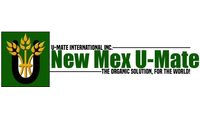

U-Mate International Inc.
- Home
- Companies
- Agriculture
- Crop Cultivation
- U-Mate International Inc.
U-Mate International Inc.
U-Mate International Inc. is an Arizona corporation organized in 1977 by Dennis Yellowhorse Jones to encourage and support the active use of organic compounds as soil additives and soil resources for the better growth and development of most varieties of plants and possible uses as a soil remediation tool. U-Mate International Inc. is a Manufacturer of real organic Humate products and organic fertilizer for better plant growth, soil conditioning and organic cultivation.
Company details
Find locations served, office locations.
- Business Type:
- Manufacturer
- Industry Type:
- Crop Cultivation
- Market Focus:
- Globally (various continents)
